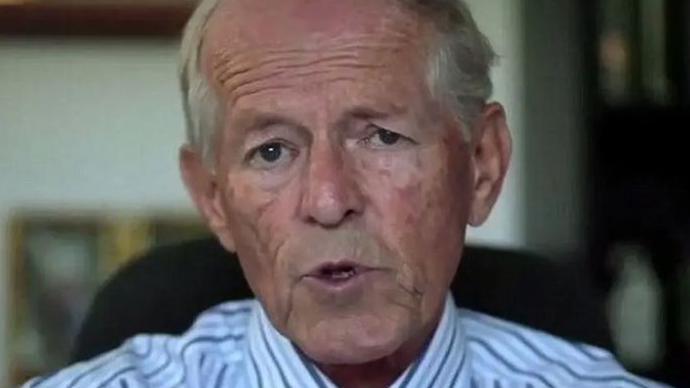Church of England covered up 'abhorrent' abuse, report finds
A British barrister's "horrific" and violent abuse of more than 100 children and young men was covered up within the Church of England for decades, according to the conclusion of a damning report.
John Smyth QC is believed to be the most prolific serial abuser to be associated with the Church of England, a long-awaited independent review found.
Smyth QC, who died aged 77 in Cape Town in 2018, was accused of attacking boys at his Winchester home who he had met at a Christian summer camp in Dorset during the 1970s and 1980s.
On publication of the findings, the Archbishop of Canterbury apologised again to victims, and said Smyth's abuse had "manipulated Christian truth to justify his evil acts".
Smyth had also worked as a barrister representing morality campaigner Mary Whitehouse whilst he ran the camps for young evangelical Christians.
Reports of his physical abuse of boys were revealed in an investigation by Channel 4 News, in February 2017.
The investigation came after a report by the Iwerne Trust in 1982, which was not made public until 2016.
Smyth was confronted about his conduct after the report compiled by Rev Mark Ruston and Rev David Fletcher.
It found Smyth identified pupils from leading public schools including Winchester College and took them to his home near Winchester in Hampshire, where he carried out lashings with a garden cane in his shed.
It said eight of the boys received a total of 14,000 lashes, while two more received 8,000 strokes between them over three years.
The Iwerne Trust called the practice "horrific" but the claims were not reported to police until 2013 - more than 30 years later.
Despite his "appalling" actions having been identified in the 1980s, the report concluded he was never fully exposed and was therefore able to continue his abuse.
He was encouraged to leave the country and moved to Zimbabwe without any referral being made to police.
During this time, church officers "knew of the abuse and failed to prevent further abuse", the independent review led by Keith Makin says.
It adds: "From July 2013 the Church of England knew, at the highest level, about the abuse that took place in the late 1970s and early 1980s. John Smyth should have been properly and effectively reported to the police in the UK and to relevant authorities in South Africa.
"This represented a further missed opportunity to bring him to justice."
In Zimbabwe he was charged with the manslaughter of a 16-year-old boy, who was attending one of his summer camps. Smyth was not convicted of the offence.
In a joint statement, the Church of England's lead safeguarding bishop, Joanne Grenfell, and the national director of safeguarding, Alexander Kubeyinje, said they were "deeply sorry for the horrific abuse inflicted by the late John Smyth and its lifelong effects, already spanning more than 40 years" and added that "there is never a place for covering up abuse".
Smyth is said to have subjected his victims to traumatic physical, sexual, psychological and spiritual attacks, permanently marking their lives.
When he died he had been in the process of being extradited from Zimbabwe and so was "never bought to justice for the abuse", the review said.
The review, commissioned a year after Smyth's death by the Archbishops' Council of the Church of England, found that an argument had been made that the abuses were "examples of over-enthusiastic corporal punishment".
But the report stated: "The conclusion of the review is that he committed criminal acts of gross abuse."
One of his victims, Bishop of Guildford Andrew Watson, said in a statement: "I want to express my deep sadness at all that has happened, and my admiration for those who have doggedly persevered in having the truth told.
"The report won’t make for easy reading for anyone involved: but it’s my hope and prayer that it might bring at least some measure of relief to Smyth’s victims – British and African, known and unknown".
While some 30 boys and young men are known to have been directly physically and psychologically abused in the UK - and around 85 boys and young men physically abused in African countries, including Zimbabwe - the total "likely runs much higher", the report said.
It said: "John Smyth is, arguably, the most prolific serial abuser to be associated with the Church of England."
After the report was published on Thursday, the Archbishop of Canterbury Justin Welby said the pain Smyth's victims endured was "unimaginable".
In a statement, Mr Welby said: "I am so sorry that in places where these young men, and boys, should have felt safe and where they should have experienced God’s love for them, they were subjected to physical, sexual, psychological and spiritual abuse."
Mr Welby said he had not been aware of Smyth's brutality before 2013, but said: “Nevertheless the review is clear that I personally failed to ensure that after disclosure in 2013 the awful tragedy was energetically investigated".
The abuse could not happen today, he added, because of modern safeguarding practices, before concluding: “John Smyth’s abuse manipulated Christian truth to justify his evil acts, whilst exploiting and abusing the power entrusted to him".
On Thursday evening, Mr Welby told Channel 4 News that he considered resigning over the scandal, but had decided to remain.
But one of Smyth's victims, Mark Stibbe, told the programme: "I think he should resign… I think there’s so much shame, so much pain, so much agony associated with this".
Smyth and his wife Anne were excommunicated by his local church in Cape Town, South Africa, the year before he died.

No comments:
Post a Comment